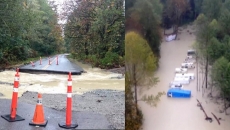MONTREAL - In just over a month, the world's largest, most advanced telescope will be launched into orbit from a spaceport in South America, and among those eagerly watching will be Montreal physics professor René Doyon.
The James Webb Space Telescope is scheduled to blast off Dec. 18 aboard the Ariane 5 rocket from the Guiana Space Center in French Guiana. The orbiting infrared observatory, a collaboration between NASA and the European and Canadian space agencies, will be 100 times more powerful than its predecessor, the Hubble Space Telescope launched in 1990.
It will feature two Canadian components: a fine guidance sensor that will help it stay locked on target, and an instrument called a Near-Infrared Imager and Slitless Spectrograph, or NIRISS, that will help study astronomical objects, from exoplanets to distant galaxies.
Doyon, a physics professor at Université de Montréal, is the principal investigator of the Canadian-built tools and has been working toward this for 20 years. He said it's both an exhilarating and a fretful time.
Before the massive telescope starts to work, there will be plenty of tense moments. The two weeks immediately after launch will be critical as the telescope unfurls in an elaborate sequence described by NASA engineers during a recent briefing as an origami exercise.
“It’s what we call the 14 days of terror — the time it takes to deploy the telescope — but I’m very confident," Doyon said in a recent interview. "We’ve tested this and retested, so there’s good reason to believe everything is going to be fine."
The telescope, named after the former NASA administrator who led the Apollo lunar exploration program, has been folded compactly for launch, and thousands of parts must work to allow it to unfold properly. It will be operated at a distance of 1.5 million kilometres from Earth, too far to be serviced as was possible with Hubble, which was just 500 kilometres away.
The instruments on the Webb telescope can only function properly at a very low temperature — minus 233 degrees C — so one of its components is a sunscreen the size of a tennis court that will shield it from the heat of the sun and the light of the Earth and moon.
Canada's contribution means that when the telescope is ready to operate — expected around the middle of next year — the country is guaranteed at least five per cent of the telescope's available observation time. Of 286 proposals accepted worldwide for the first year of use, 10 will have Canadians as the principal investigators.
Many have been waiting eagerly for Webb's launch, which has been delayed several times. Doyon said Webb's infrared wavelength viewing capabilities mean scientists will be able to see some things for the first time, like the first stars and galaxies from the early universe after the Big Bang. It will also represent a huge leap for the study of exoplanets — planets outside our solar system — to probe their atmospheres for clues of early life.
Sarah Gallagher, science adviser at the Canadian Space Agency, said it's an exciting time.
"It’s the culmination of decades of work by really talented people, and I’m so proud of our Canadian contribution, the scientific one and the industrial one. I think it really showcases the strength of our community," she said in an interview.
“We have people who want to study bodies in our solar system, planets around other stars, galaxies in the very early universe and all sorts of different topics."
Among them will be Loïc Albert, who will be able to continue his work on brown dwarfs — essentially failed stars. The project involves looking for companions for about 20 of them, and he will use Webb's sensitivity to his advantage.
“In my case, James Webb opens the possibility of studying some specific types of brown dwarfs, the coldest and the least massive brown dwarfs. They are so faint that you can’t observe them from the ground,” said Albert, a researcher at Université de Montréal and a scientific instrument expert for Webb.
Albert says scientists who've been studying exoplanets using Hubble's limited capability should reap the rewards of Webb. "For the exoplanet community, it’s going to be a game changer," he said in an interview. "It’s going to allow measuring exoplanet atmospheres for a large number of planets and at exquisite detail."
Doyon, who is planning to travel to French Guiana for the launch next month, said the prospect of unintended discoveries is the most exciting part ahead of Webb's launch.
“Every time a new telescope is started, history shows that after five or 10 years, you ask the question, what was the biggest discovery the telescope did. It’s something that was not planned,” he said. "I’m sure Webb will be the same."






